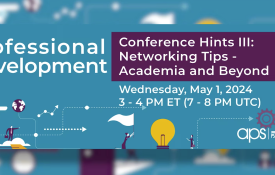-

New Research From Clinical Psychological Science
A sample of research on personality pathology and momentary stress processes, stereotypes and OCD-symptom presentations, threat appraisal and pediatric anxiety, and much more.
-
Can scientists ‘solve’ stress? They’re trying.
As modern-day stress ratchets up to what feels like unbearable levels, researchers are striving to learn more about the precise mechanisms through which it affects our body and mind. The hope is that by unlocking more about how stress works physiologically, we can find ways to prevent it from permanently harming people. ... Katie McLaughlin, a psychologist at the University of Oregon, is investigating how mental health problems arise in adolescents as they’re going through a particularly vulnerable time in their lives, transitioning to adulthood.
-

Seifert Is the New Editor of PSPI
APS Fellow Colleen M. Seifert, an expert on creative problem-solving at both the basic and applied levels, is the new editor of Psychological Science in the Public Interest (PSPI). She follows APS William James Fellow Nora Newcombe, who has served as editor of the journal since 2019.
-

New Content From Advances in Methods and Practices in Psychological Science
A sample of articles on implementing and using community-augmented meta-analyses, studying what people say to each other, open-science guidance for qualitative research, and much more.
-

Networking Inside and Outside the Academy
In an APS Professional Development webinar, five psychological scientists shared their own experiences and advice on expanding your relationships not only in academic circles, but in industry as well.
-

Teens Who View Their Homes as More Chaotic Than Their Siblings Have Poorer Mental Health in Adulthood
Many parents ponder why one of their children seems more emotionally troubled than the others. A new study in the United Kingdom reveals a possible basis for those differences.

